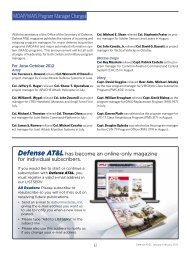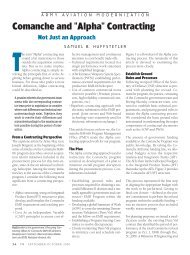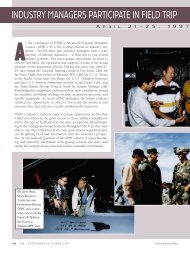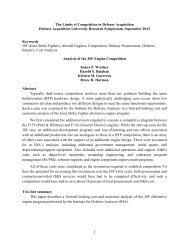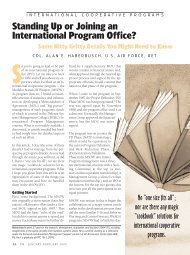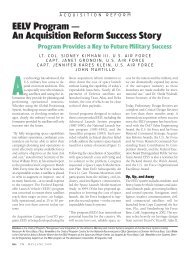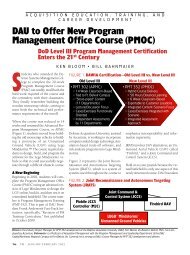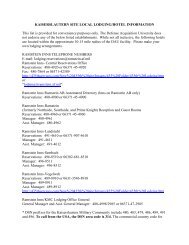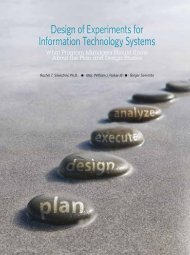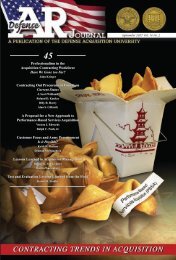Defense ARJ - Defense Acquisition University
Defense ARJ - Defense Acquisition University
Defense ARJ - Defense Acquisition University
Create successful ePaper yourself
Turn your PDF publications into a flip-book with our unique Google optimized e-Paper software.
PPBe: a reD or a Blue Pill?<br />
reminiscent of the storyline in the 1999 movie, The Matrix, where the main character,<br />
Neo, must make sense under paradoxical worldviews represented by a blue or red pill<br />
(Wachowski & Wachowski, 1999). If Neo takes the blue pill, he accepts the well-ordered<br />
world to which he is accustomed, unaware that he is asleep and that his psyche<br />
is being fed by a computer program (called the Matrix). However, if he takes the red<br />
pill it will mean facing a deeper meaning of reality that may be shockingly unpleasant<br />
to accept. He would no longer be isolated from the harsh reality that the world is really<br />
a very messy place, ridden with surprises, death, and destruction. Neo chose the<br />
harsher, more uncomfortable reality and ultimately led his followers to emancipation<br />
through revolution (metaphorically, a transformation that overthrew the technically<br />
rational world view provided by the Matrix).<br />
Social problems are never solved…at best they are only resolved—over<br />
and over again.<br />
Consider that <strong>Defense</strong> managers have created the conceptual categories of internal<br />
and external environments as parsimonious coping devices to separate order (the<br />
“blue pill”) from chaos (the “red pill”). As Neo struggled with the seductive stability<br />
and predictability that the blue pill promised, managers are culturally enticed to<br />
believe the DoD can operate through forms of technical rationality in the inner world,<br />
while not having to acknowledge the bounded limitations of technical rationality in<br />
the outer world (Simon, 1997).<br />
Restated in terms borrowed from the study of cultures, managers are emic (observing<br />
as an insider) and not etic (observing as an outsider) with respect to making<br />
sense of the environment (Martin, 2002); hence, they must perceive themselves to<br />
function in both the social-psychological creation of order from disorder simultaneously<br />
and inseparably. They will realize that unilateral sensemaking in the context<br />
framed solely by the technical rationality assumptions of the “blue pill of PPBE” is<br />
a naïve undertaking if they agree about the hyperturbulent nature of the COE. The<br />
Marion quote at the beginning of this essay is worth repeating here: “Rationality, of<br />
course, is a moot issue when causality is poorly understood” (1999, p. 142).<br />
collaBoratiVe, Professional–client senseMakinG<br />
Whereas the PPBE is based in the idea of being technically rational about the<br />
future, managers contend with the political context—the world of their clients. They<br />
realize that attempting to convincingly frame knowledge about the future for which<br />
no one can foretell is always the hallucination of linear causality. In that regard,<br />
PPBE has an impossible assumption of predictability when viewed in the context of<br />
1 5 9



